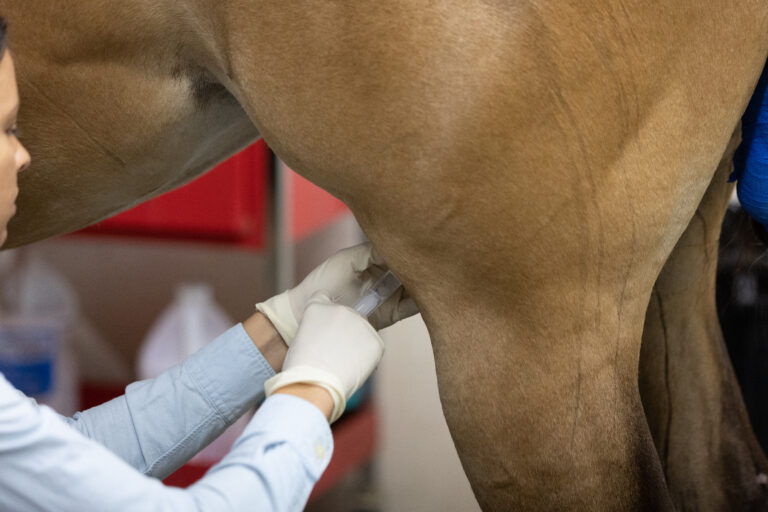
Research has yielded more specifics on gastric ulcer disease, including the identification that two different forms exist: 1) equine squamous gastric disease (ESGD) and 2) equine glandular gastric disease (EGGD). The pathophysiology of each is different from the other, as, for example, EGGD is associated with a mixed inflammatory response of the mucosa rather than ulcerations as seen with ESGD. Most of the lesions of EGGD occur around the pyloric antrum; however, the inflammation results in generalized gastritis. Previous reports suggest that exercise more than five days a week is associated with 3.5 times greater risk of developing EGGD.
Omeprazole therapy has not been proven very effective for management of EGGD, further suggesting that the etiology might have more to do with inflammation than with acid contact with the glandular mucosal tissues. To date, there is no medication licensed for the treatment of EGGD.
A study compared the use of combined omeprazole and sucralfate with misoprostol, which is a prostaglandin E2 analogue used in humans with refractory glandular disease. Its effects include “inhibition of gastric acid and pepsin production and secretion, enhancement of mucosal resistance to injury, promotion of gastric mucosal proliferation, increase in gastric mucosal blood flow, as well as anti-inflammatory properties” [Varley, G.; Bowen, M; Habershon-Butcher, J.L. et al. Misoprostol is superior to combined omeprazole-sucralfate for the treatment of equine glandular disease. Equine Veterinary Journal 2019, doi: 10.1111/ evj.13087].
Sixty-three sporthorses demonstrating signs of gastric disease that received no treatment were scoped to confirm and record changes in the squamous and glandular gastric mucosa. All lesions involved the pylorus and/or the pyloric antrum. Most of the horses were presented for poor performance with other signs of behavioral changes, girthing pain, weight loss, appetite changes, hair coat changes, colic and teeth grinding. Two or more of these clinical signs were present in 68% of the horses in the study. The most common combination of signs was poor performance coupled with behavior changes or girthing pain. Other studies have reported unexplained weight loss as a typical presenting sign of EGGD.
One group of 43 sporthorses received misoprostol (5 micrograms/kg) twice daily when concentrate was fed; the other group of 20 received omeprazole (4 mg/kg) once daily an hour before feeding hay or concentrate, plus sucralfate (12 mg/kg) twice daily at the time of concentrate feeding. Endoscopy was repeated 28-35 days after the initial exam and start of the medication.
Healing in this study was considered as complete resolution of lesions. The results:
- Healing occurred in 72% treated with misoprostol and only 20% treated with combined omeprazole-sucralfate (OS).
- Glandular improvement occurred in 98% of misoprostol-treated horses compared to 65% of OS-treated horses.
- No lesions worsened over the 35-day time period in either group.
Misoprostol is used in humans to terminate pregnancy, so caution must be taken by owners and veterinarians administering the medication, including advice to wear gloves when handling. In this study, no horses demonstrated adverse effects, although there have been reported cases of mild, self-limiting diarrhea or pruritus that resolved when misoprostol was stopped.
The study concluded: “Misoprostol was found to be superior to combined omeprazole-sucralfate, both for improvement and healing of glandular lesions.”

![[Aggregator] Downloaded image for imported item #18379](https://s3.amazonaws.com/wp-s3-equimanagement.com/wp-content/uploads/2025/09/30140703/EDCC-Unbranded-15-scaled-1-768x511.jpeg)
![[Aggregator] Downloaded image for imported item #18808](https://s3.amazonaws.com/wp-s3-equimanagement.com/wp-content/uploads/2025/11/06141153/EDCC-Unbranded-17-scaled-1-768x512.jpg)

